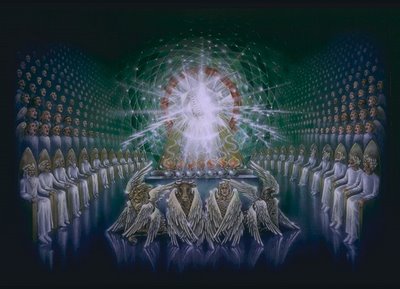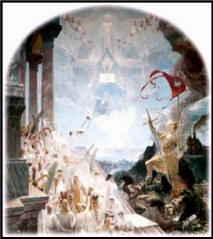
This is a sermon podcast on 1 Corinthians 7 given at the Bible Truth Fellowship on
October 4, 2009.

Question:
Discuss the possible cultural background of the Gospel of John. Suggest what sort of historical-cultural situation John’s Gospel might have been originally intended to address.
Answer:
The Gospel of John differs from the Synoptic Gospels by “translating” certain elements when compared to the Synoptic Gospels in order to probably reach a different audience. For example, in the Gospel of John, it is mentioned that the presence of eternal life exists here and now . The New Testament speaks in a tone (in regards to eternal life) as an event to take place in the future and the Gospel of John speaks about eternal life as being already here which would be similar to the Synoptic Gospels phrase “the kingdom of God” being present now and to be fully realized in the future. This translated point that eternal life exists here and now suggests that the audience were not Jews and would not be familiar with the meaning of the phrase “the kingdom of God”. This would then suggest that the audience were Gentiles. The tradition of the Early Church holds the belief that the Gospel of John was written by either “John the Elder”, or “John the Apostle”. Even though it is uncertain who exactly wrote this Gospel, the consensus is that this Gospel was composed in Ephesus, Syria, or Alexandria . These three areas were predominately Gentile, or in the case of Alexandria, separated enough from Jewish influence that the audience would understand the changes that the Gospel of John speak of if compared to the Synoptic Gospels. When looking at the choice of words that the Gospel of John uses and in light of the historical information as to where this Gospel was composed, it is logical to suggest that the intended audience were Gentiles who would not understand Judaic concepts or beliefs.

Question:
In the book of Revelation, how do the people of God come to participate in the reign of God and the Lamb, what’s their role in conquering the bad guys? What are one or two implications for what we are called to as we follow Jesus today.
Answer:
The people of God come to participate in the reign of God and the Lamb by becoming a saint, being part of the first resurrection of Christ, or being one of the 144,000. The role they serve in conquering the bad guys is to offer praises to the Lord. The angels of the Lord battle with Satan and his minions...there is not a reference in Revelation that any of us actually "battle" anyone. One or two implications for what we are called to as we follow Jesus today is summarized well in Revelation 14:7: ..."Fear God and give him glory, because the hour of his judgment has come. Worship him who made the heavens, the earth, the sea and the springs of water."
 Question:
Question:
According to Hebrews, what is the significance of Jesus’ work for the everyday life of the people of God? How might this be applied to your contemporary context (is there something analogous to the struggles confronting the recipients of the letter)?
Answer:
Jesus was the final sacrifice for sin creating a New Covenant, which ushered in a new period for all the people of God who are ruled by faith and are being "assured" of what is hoped for and certain of what is not seen (Heb. 11:1).
In regards to the work of the every day life of the people of God, we need to: keep loving each other as brothers and sisters, entertain strangers (spread the gospel message), remember those in bondage, honor marriage, keep our lives free from this world, remember our leaders (apostles), test our faith being careful not to be led astray by strange teachings, continually offer God praise, do “God’s good works” and share these with others, and pray (Heb. 13).
Applying this to our context today, not much has changed, though more stress can be put on the author's call for perseverance. Faith requires action, which is proven in the many examples in chapter 11, and we need to "draw near to God with a sincere heart in full assurance of faith" to follow the path God has laid out before us (Heb. 11:22).
More Recent Articles
|